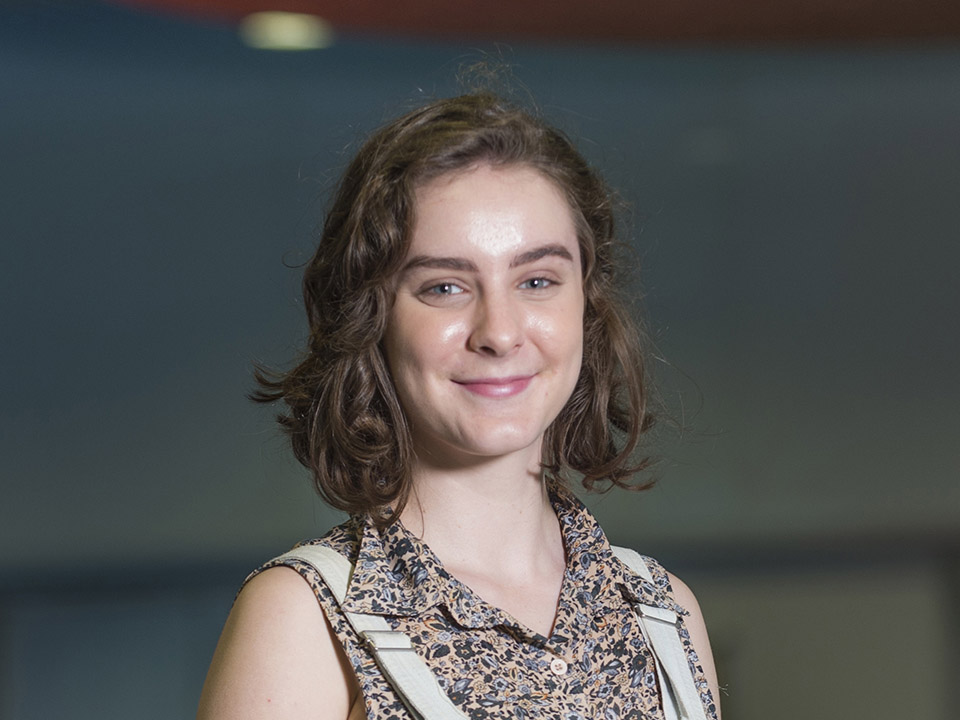Think advanced science. Think QUT.
Study alongside a small cohort of high-achieving fellow science enthusiasts for four years. You'll be immersed in real-world research from your first year in authentic research environments, with leading QUT researchers and projects.
Unfolding the history of our planet
Tune in to the Pale Blue Dot podcast to hear hosts Dr Luke Nothdurft and Dr David Flannery discuss some of the biggest questions and mysteries of our planet with leading scientific experts from QUT and beyond. This podcast series is part of the online content for the Evolving Earth unit in the Earth Science major.
Real-world learning experiences
Our environmental science degrees are packed with field trips and real-world learning experiences. Earth science units take you to places around Queensland, New South Wales and South Australia to learn about Earth processes that produce the landscapes we now live in, and the history of our ancient continent.
Our search for ancient life on Mars
Dr David Flannery explains QUT’s involvements in NASA Mars Rover operations, including the development of critical key software packages.
Find your tribe
'One of the really great things that I found was the Natural Resources Society. When I first came to uni, I didn’t know anybody at all, and I mustered up the courage in my first semester to go along to the NRS welcome barbecue. I found it to be just a really warm and welcoming community, of everybody from first year through to postgraduate - and just that real sense of community that it fostered, I found really, really valuable.'
Think advanced science. Think QUT.
Study alongside a small cohort of high-achieving fellow science enthusiasts for four years. You'll be immersed in real-world research from your first year in authentic research environments, with leading QUT researchers and projects.
Our search for ancient life on Mars
Dr David Flannery explains QUT’s involvements in NASA Mars Rover operations, including the development of critical key software packages.
Real-world learning experiences
Our environmental science degrees are packed with field trips and real-world learning experiences. Earth science units take you to places around Queensland, New South Wales and South Australia to learn about Earth processes that produce the landscapes we now live in, and the history of our ancient continent.
Unfolding the history of our planet
Tune in to the Pale Blue Dot podcast to hear hosts Dr Luke Nothdurft and Dr David Flannery discuss some of the biggest questions and mysteries of our planet with leading scientific experts from QUT and beyond. This podcast series is part of the online content for the Evolving Earth unit in the Earth Science major.
Find your tribe
'One of the really great things that I found was the Natural Resources Society. When I first came to uni, I didn’t know anybody at all, and I mustered up the courage in my first semester to go along to the NRS welcome barbecue. I found it to be just a really warm and welcoming community, of everybody from first year through to postgraduate - and just that real sense of community that it fostered, I found really, really valuable.'
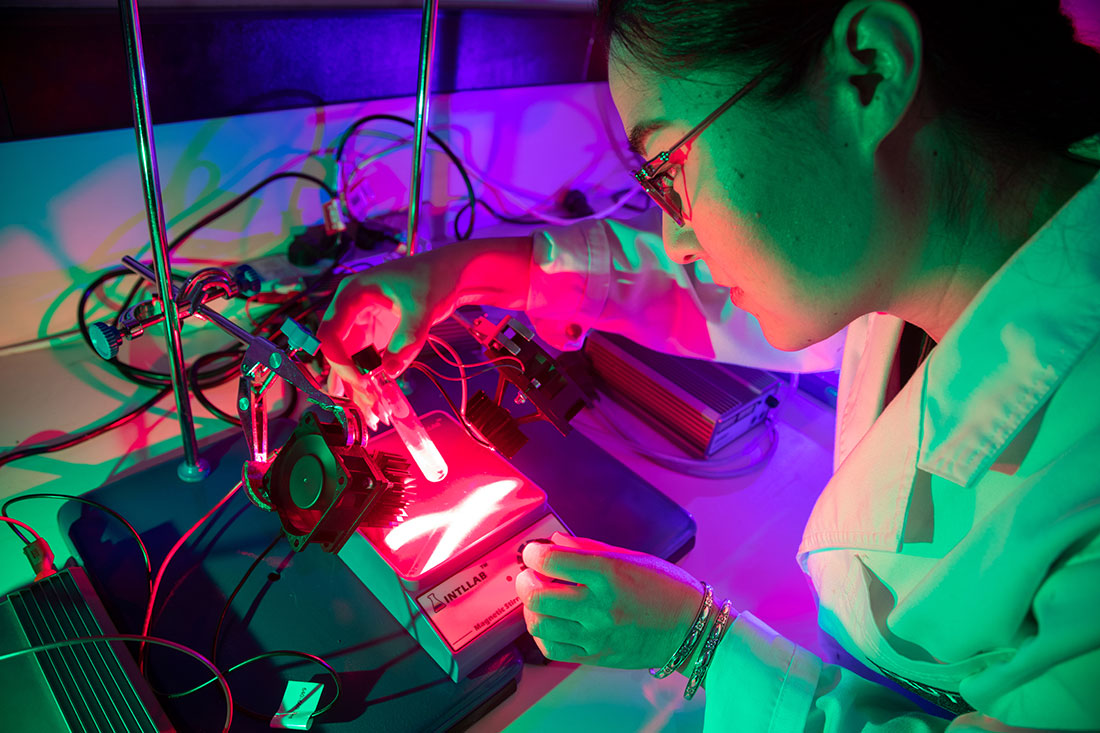

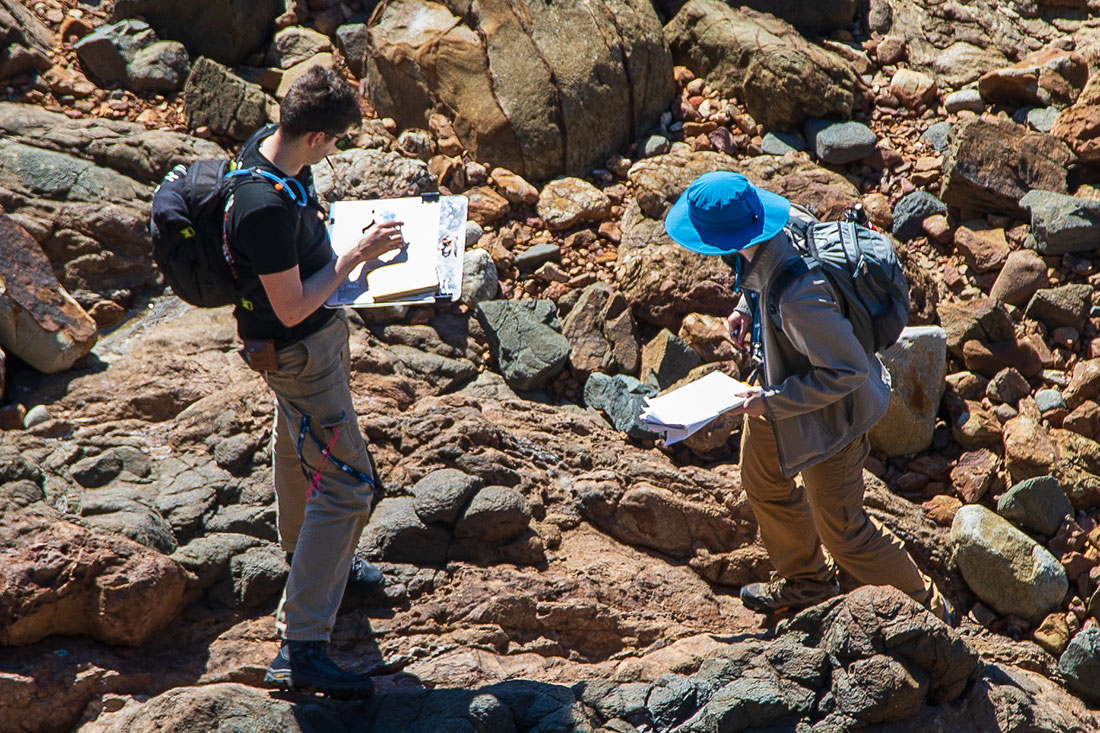
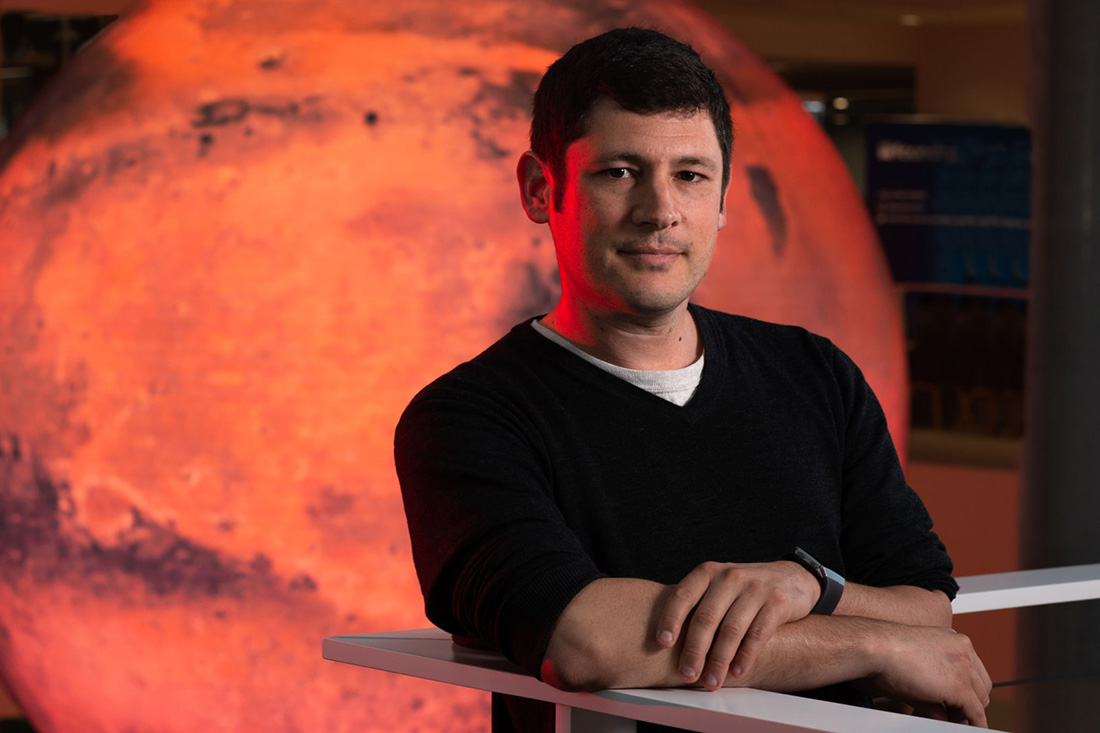
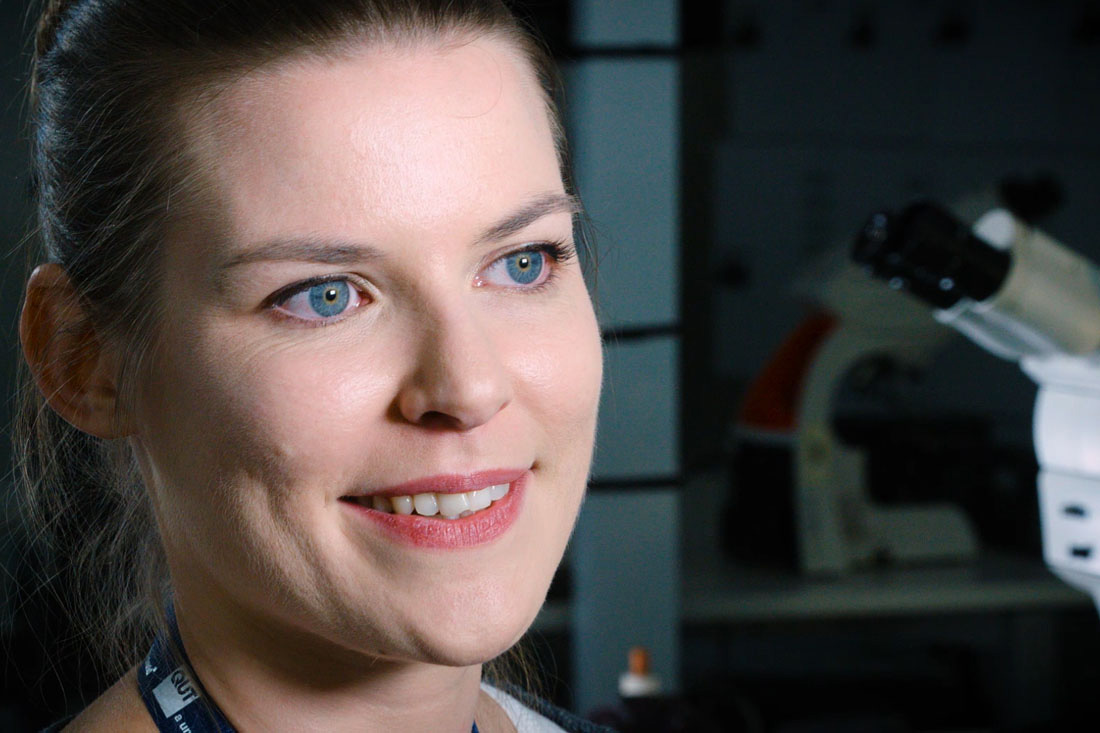





Highlights
- Designed for high-achieving students interested in a career in science research.
- Bypass general science units to get straight into Earth Science.
- Immerse yourself in real-world research from your first year – with authentic research environments and projects.
- Study alongside other high-achieving students, with leading QUT researchers in the labs and facilities.
- Specialised quantitative mathematics minor to build analytical skills needed to underpin your scientific research.
- Students achieving a minimum unadjusted ATAR of 98 may be eligible for QUT Excellence Scholarships, valued at $30,000.
Highlights
- Designed for high-achieving students interested in a career in science research.
- Bypass general science units to get straight into Earth Science.
- Immerse yourself in real-world research from your first year – with authentic research environments and projects.
- Study alongside other high-achieving students, with leading QUT researchers in the labs and facilities.
- Specialised quantitative mathematics minor to build analytical skills needed to underpin your scientific research.
- Graduate eligible for membership in a number of professional societies, such as the Geological Society of Australia and Australian Institute of Geologists.
Why choose this course?
QUT’s new Bachelor of Science (Advanced) will give you the passport to an international research career with an internationally recognised qualification.
This course is designed for those who have a passion for scientific inquiry and seek to pursue a career in scientific research. You’ll have successfully completed Year 12 Mathematical Methods and a Science subject. By meeting these prerequisites, you’ll be able to bypass general science units to get straight into your area of passion - in this case, earth science.
This course blends the traditional fields of geology, physical geography and oceanography/hydrology. You will explore current research issues with theory and industry-related, hands-on field, laboratory and modelling work to identify possible solutions.
This course is exclusively offered to a small cohort of high-achieving, driven students. This means you’ll receive dedicated support and opportunities, within that community of practice. You’ll study alongside other like-minded students, with leading QUT researchers in the labs and facilities; and immerse yourself in real-world research from your first year – with authentic research environments and projects. You’ll engage with the science research community and participate in QUT’s Science Research Symposium from your first year of studies – where scientific work is presented, critiqued and questioned.
You will have the opportunity to extend your studies in Earth science through participation in extracurricular activities (for example, Vacation Research Experience Scheme (VRES), industry placements and research assistant positions, within which you can continue your research career beyond undergraduate study.
Real-world learning
Research is the practice of science, and this course has been designed to give you access to authentic research environments, using state-of-the-art research facilities in cutting-edge research contexts from your first year. You'll receive mentoring from academic staff, existing HDR students and higher-level students in the Advanced Science program.
You'll receive an early entry into the QUT Science Research Community, which brings the opportunity to develop professional networks and connectedness to both your peers and potential employers. Your involvement in the student-led organisation of a research symposium will provide an authentic work-integrated learning (WIL) experience, and link to cutting edge research, not just at QUT but in a national and global context. You'll engage with current research, emerging topics and will experience the impact of scientific research on everyday life.
You will have opportunities to undertake embedded WIL experiences or internships throughout your studies, engaging with research groups, industry partners and translational research areas.
Learn from the best
QUT has a strong reputation for providing real-world courses with real-world outcomes. This isn’t just about securing a job – it’s about giving you the skills and knowledge you need to change the world and make a difference.
Our teaching teams are experts in scientific research, including climate change, natural hazards, marine and ocean science and renewable energies - the current and emerging issues in science. This means you have access to the leaders in scientific research, both as lecturers and as mentors.
Explore this course
In this new, embedded honours specialised course, you can expect to study alongside a small cohort of high-achieving fellow science enthusiasts for four years. You'll be immersed in real-world research from your first year in authentic research environments, with leading QUT researchers and projects.
Earth science (also known as geoscience) blends the traditional fields of geology, physical geography and oceanography/ hydrology. Geology describes the rocky parts of the Earth’s crust (or lithosphere) and its development. Physical geography, which studies the Earth’s surface, includes geomorphology, soil science, biogeoscience and atmospheric science. The marine and freshwater parts of the Earth define the fields of oceanography and hydrology.
The Earth is an amazing place and for an earth scientist, it offers a unique natural laboratory that covers space and time. Earth science is a multidisciplinary science that applies chemistry, physics, biology and mathematics tools to understand earth processes, decipher its past and predict its future. Earth scientists work to monitor changes in the Earth’s environment and suggest solutions to problems. They study natural hazards to prevent loss of life and reduce property damage. Earth scientists play key roles in the search for energy resources and minerals. Climate change, earthquakes and renewable energy are just a few of the issues that require knowledge of earth science.
Careers and outcomes
As a graduate of Bachelor of Science Advanced (Honours), you will be an emerging research scientist, having played a significant role in designing, planning and executing an independent research project at the forefront of science and technology. Possessing advanced knowledge and skills in scientific research and analysis methods, you will have experience in applying these skills to design experiments and solve complex real-world problems. High-level communication skills will ensure you can present knowledge and ideas clearly and effectively, in both oral and written forms, to diverse audiences. You will be a critical thinker, able to apply judgement, to develop new understanding, to consolidate and synthesise new knowledge, and to adapt readily to different contexts.
These transferable skills will make you a highly valued as a STEM professional and are applicable across multiple industries. Those skills, together with your depth of knowledge in your specialist study area, will provide countless employment opportunities, including:
- Geologist
- Climate Scientist
- Natural hazard analysist/modeller/mitigation expert
- Oceanographer
- Geotechnical engineer
- Data scientist
- Researcher
- Laboratory manager.
Professional recognition
Graduates are eligible for membership in a number of professional societies, such as the Geological Society of Australia, Australian Institute of Geologists and other overseas professional societies.
Research pathways
This honours-level qualification has a strong focus on research pathways in STEM and provides you with a more specialised degree, for a particular science discipline. As a graduate, you will be ideally prepared to enter a PhD program.
Possible careers
- Exploration geologist
- Geologist
- Geophysicist
- Geoscientist
- Hydrogeologist
- Laboratory assistant
- Marine scientist
- Mine geologist
- Natural resource scientist
- Project manager
To meet the course requirements of the Bachelor of Science Advanced (Honours), you must complete a total of 384 credit points, made up of:
- Core units - 24 credit points
- A Major – 240 credit points, which includes Advanced Research units (72 credit points)
- QUT You - 24 credit points
Earth science major students are also required to complete the following complementary studies components (minors) -
- one minor (48cp) chosen from:
- Applied Mathematics minor
- Statistical Modelling minor - and one minor (48cp) chosen from:
- Geology Extension minor
- Advanced Science minor
Please note, students are expected to have a minimum GPA of 5.5 prior to entry to Honours level units in year 4. Students who do not meet this requirement will liaise with the Course Coordinator to discuss strategies for completion.
To meet the course requirements of the Bachelor of Science Advanced (Honours), you must complete a total of 384 credit points, made up of:
- Core units - 24 credit points
- A Major – 240 credit points, which includes Advanced Research units (72 credit points)
- QUT You - 24 credit points
Earth science major students are also required to complete the following complementary studies components (minors) -
- one minor (48cp) chosen from:
- Applied Mathematics minor
- Statistical Modelling minor - and one minor (48cp) chosen from:
- Geology Extension minor
- Advanced Science minor
Please note, students are expected to have a minimum GPA of 5.5 prior to entry to Honours level units in year 4. Students who do not meet this requirement will liaise with the Course Coordinator to discuss strategies for completion.
- ATAR/selection rank threshold
- 88.00
- Additional entry requirements
- Yes
These thresholds are the lowest adjusted scores to which QUT made an offer in Semester 1, 2025.
Don't have a ATAR/selection rank?
- Course code
- ST20
- QTAC code
- 418052
- CRICOS code
- 102820D
- 4 years full-time
- 4 years full-time
- February
- February
Assumed knowledge
Before you start this course, we assume you have sound knowledge of the subject/s listed below. If you don't have the subject knowledge, you can still apply for the course but we strongly encourage you to undertake bridging studies to gain the knowledge:
- Specialist Mathematics (Units 3 & 4, C)
At least one of Agricultural Science, Chemistry, Earth and Environmental Science, Marine Science, or Physics (Units 3 & 4, C) in addition to prerequisite.
Prerequisites
Before you start this course, you must have obtained the required result for the Queensland year 12 subjects (or equivalent senior subjects) listed below within your Year 12 studies.
-
English, or Literature, or English and Literature Extension, or English as an Additional Language (Units 3 & 4, C); and
-
Mathematical Methods (Units 3 & 4, C); and
-
At least one of Agricultural Science, Biology, Chemistry, Earth and Environmental Science, Marine Science or Physics (Units 3 & 4, B).
Additional entry requirements
You must be a 2025 Year 12 student or a recent Year 12 student returning from up to two gap years.
Adjustments to your ATAR/selection rank
Elite Athlete Scheme adjustments do not apply to this course. Any other adjustments you receive to your ATAR or selection rank will be applied to this course.
Find out if you're eligible for an adjustment to your ATAR or selection rank
Offer guarantee
If you achieve an ATAR or selection rank of 88.00 or higher (including any adjustments) and satisfy all other admission requirements, you are guaranteed an offer for this course.
Deferment
You can defer your offer and postpone the start of your course for one year.
More about deferring your offer
Offers we made to school leavers in Semester 1, 2024
The figures listed in the tables below reflect the offers that were made to recent ATAR students. The entry thresholds box at the top of this page shows the lowest adjusted ATAR/selection rank required to receive an offer for all applicants for the most recent January QTAC offer round.
| Excluding adjustments | Including adjustments | |
|---|---|---|
| Highest ATAR/selection rank to receive an offer |
Selection rank
96.55
|
Selection rank
99.95
|
| Median ATAR/selection rank to receive an offer |
Selection rank
93.65
|
Selection rank
97.35
|
| Lowest ATAR/selection rank to receive an offer |
Selection rank
92.20
|
Selection rank
94.25
|
You can find out more about your fellow students’ backgrounds with this course’s student profile.
Other admission options
If you are of Aboriginal or Torres Strait Islander descent, you may be eligible for admission through our Centralised Assessment Selection Process (CASP).
Entry requirements
You must be a current Year 12 student or a recent Year 12 student returning from up to two gap years.
Prerequisites
Before you start this course, you must have obtained the required result for the Queensland year 12 subjects (or equivalent senior subjects) listed below within your Year 12 studies.
-
English, or Literature, or English and Literature Extension, or English as an Additional Language (Units 3 & 4, C); and
-
Mathematical Methods (Units 3 & 4, C); and
-
At least one of Agricultural Science, Biology, Chemistry, Earth and Environmental Science, Marine Science or Physics (Units 3 & 4, B).
Minimum English language requirements
We accept English language proficiency scores from the following tests undertaken in a secure test centre. Tests must be taken no more than 2 years prior to the QUT course commencement.
| English Test | Overall | Listening | Reading | Writing | Speaking |
|---|---|---|---|---|---|
| IELTS Academic / One Skill Retake | 6.5 | 6 | 6 | 6 | 6 |
|
Cambridge English Score
You must share your results with QUT through the Candidate Results Online website. |
176 | 169 | 169 | 169 | 169 |
| PTE Academic | 58 | 50 | 50 | 50 | 50 |
| TOEFL iBT | 79 | 16 | 16 | 21 | 18 |
Don't have the English language score you need? We can help!
We offer English language programs to improve your English and help you gain entry to this course.
When you apply for this course, we will recommend which English course you should enrol in.
Applying for this course
Applying for this course
Your actual fees may vary depending on which units you choose. We review fees annually, and they may be subject to increases.
2026 fees
2026: Fee available from October
2026 fees
2026: Fee available from July
2025 fees
2025: CSP $8,300 per year full-time (96 credit points)
2025 fees
2025: $43,600 per year full-time (96 credit points)
Student services and amenities fees
You may need to pay student services and amenities (SA) fees as part of your course costs.
HECS-HELP: loans to help you pay for your course fees
You may not have to pay anything upfront if you're eligible for a HECS-HELP loan.
You can apply for scholarships to help you with study and living costs.
QUT Excellence Scholarship (Academic)
QUT's premier offering for students with outstanding academic achievement.
- Scholarship eligibility
- Academic performance
Equity scholarships scheme
A scholarship for low-income students studying in any faculty.
- Scholarship eligibility
- Struggling financially
QUT Elite Sport Scholarship
QUT's premier offering for students with outstanding sporting achievement.
- Scholarship eligibility
- Sporting excellence
International Merit Scholarship
A high achievement scholarship for future international undergraduate and postgraduate students.
- Scholarship eligibility
- Academic performance
Oodgeroo Noonuccal Undergraduate & Postgraduate Scholarship
The Oodgeroo Scholarship Program promotes the pursuit of Indigenous Australian studies by supporting the education of Indigenous Australians.
- Scholarship eligibility
- Indigenous Australian
QUT Budding Entrepreneur Scholarship
A scholarship for innovative individuals who are engaged in their passion for entrepreneurial action.
- Scholarship eligibility
QUT Rising Sports Scholarship (including esport)
Opportunities exist for aspiring esports players to be part of an Oceanic leading program that embraces skill-acquisition, culture and academics.
- Scholarship eligibility
- Sporting excellence
Keep up to date
QUT courses for you
Like to save your courses?
Please enter your first name and email so we can save your courses for you
